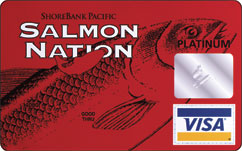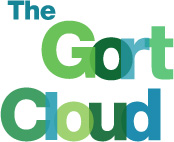 |
Like every other American, I have been sitting in awe as our mighty financial institutions have vaporized before our eyes. So, I began to wonder: How have green financial groups been doing? I wondered because earlier this year I had interviewed leaders of Portland's "Salmon Nation" banking and investment alliance for my forthcoming book: "The Gort Cloud: The Invisible Force Powering Today's Most Visible Green Brands."
The companies joining in this financial venture have been thinking big. They are attempting to build not only their own individual financial brands, but also a whole new conservation-based economy stretching over a thousand miles of the Northwest Pacific Coast. They've labeled their community Salmon Nation, after the area where Pacific salmon run.
Three of the financial organizations involved in building and branding Salmon Nation are Ecotrust, a self-described conservation organization promoting natural capital objectives in the Pacific Northwest and creator of the Salmon Nation concept; Portfolio 21, an investment company that works in partnership with Ecotrust objectives; and ShoreBank Pacific, a full-service bank formed by a partnership between Ecotrust and Chicago's ShoreBank Corp. All three are neighbors at Ecotrust's Natural Capital Center building in Portland, and all share in the vision of Salmon Nation.
In contrast to Wall Street, where profits and investor returns trump all, Salmon Nation is modeled on a broader principal where profits aren't necessarily everything because protecting the health of the planet while ensuring social equality are just as important.
Ecotrust: Dedicated to Economy, Ecology and Social Equality
Spencer Beebe founded the nonprofit Ecotrust in 1991 to preserve the temperate rain forests of his Northwest home and to spread the economic rewards from sustainable development among all the region's citizens, including Native Americans. He's a fourth-generation Portlander who had previously spent 14 years with The Nature Conservancy, serving as the organization's West Coast director. He also helped to found Conservation International.
Ecotrust's underlying principle is that sustainability is best achieved through the development of localized economies. To that end, it funds local and sustainable projects that fall roughly under the headings of food and farms, Native American, fisheries, and forestry.
On Wednesday, I sent Howard Silverman, a writer and analyst for Ecotrust, an email. "How are you guys doing amid this Wall Street mess? Are you singed, immune, engulfed? Please do tell."
Silverman promptly responded with a reply from Beebe. Speaking in particular about Salmon Nation's headquarters, Beebe says, "The Natural Capital Center is full and has been from day one. We're getting market rents, almost 4 million visitors, and host to over 2,000 conferences. We turn down a potential tenant every 1-2 weeks for lack of space." Sitting in the heart of Portland's Pearl District, the Natural Capital Center is a nexus for the green community. It hosts a farmer's market, retail shops including Patagonia, meeting spaces and restaurants.
As mentioned, Ecotrust has focused on building a "conservation economy" based on the principles of economy, ecology and (social) equality -- what Beebe describes as the three Es. In addition to his efforts in the Pacific Northwest, "Ecotrust Australia was launched last week based on careful analysis of Ecotrust and Ecotrust Canada as models for addressing native, community, environmental and economic needs in Australia." Sighting Thomas Friedman's new book "Hot, Flat and Crowded," Beebe describes the Ecotrust economic communities as "bioregional arks supporting hundreds of Noahs (local leaders) and trying to inspire innovation around a new system-wide approach to conservation and development."
In 2004 Beebe repurposed the phrase Salmon Nation from a book Ecotrust published in 1999. It became a goal-defining phrase linking Ecotrust to the conservation economy theme. The genius in this concept is that the founders created a brand around a goal in which everyone in the Northwest can take ownership. Even those who aren't investors or account holders can take pride in the vision. Try that with Citibank, Merrill Lynch or Oppenheimer Funds, or any other Wall Street firm.
ShoreBank Pacific: Support Sustainable Local Business
ShoreBank Pacific is the implementation arm of Salmon Nation, a retail bank that services local depositors and makes loans to local businesses. Last spring, I met ShoreBank's dry-witted CEO, Dave Williams. "My children remember the time when I used to say recycling was a conspiracy to move garbage out of the landfills and into our garage," he says. And now imagine Williams, this fiscal conservative, running a green bank in the People's Republic of Portland.
"I understood the business reasons" for going green, Williams continues. "It's the right thing to do. Secondly, you can't have a business where you're going to go out, cut down all the trees, then shut down the mill since you've harvested all the trees and now have to wait 40 years to begin again. It doesn't work to harvest all the fish then shut down the canneries. So if you're looking for sustainability, and you're looking for sustainable communities, you've gotta have sustainable business, which means you've gotta do things in an environmentally sensitive way."
In 1997, Ecotrust and ShoreBank Corp. formed ShoreBank Pacific, opening its doors in a double-wide trailer as "the first commercial bank in the United States with a commitment to environmentally sustainable community development." It's a perfect example of what Ecotrust likes to do -- start and/or support unique businesses with a sustainable framework and spread the Salmon Nation mission.
So how is the bank doing? I asked this as I read that Washington Mutual has just been taken over by federal overseers.
"We, like many community banks, have avoided the mortgage mess, thinking that there are a lot of folks in the mortgage business and we don't need to go there," Williams says. "Further, since we are privately held and therefore immune from the quarterly forces of tomorrow's earnings, we avoided the developer loans that so many community banks went after to bolster earnings. And we have always felt that buying the securities of the agencies is a mistake that would cause us to incur their risk when it isn't something that we want to incur ourselves. (Nevertheless we) are very concerned about the tariff that we will need to pay to the FDIC to rebuild the reserve fund for the folks who did play these games.
"As a result, we are very strong from a capital and liquidity perspective and are being approached by banks that are in a little worse shape to acquire them."
Beebe sums up the bank's performance: "ShoreBank Corporation has taken in almost $30 million in new capital investors recently verses bailouts on Wall Street. Goldman Sachs and Morgan Stanley converted to bank holding companies last weekend. That is what ShoreBank invested in almost 40 years ago -- using a bank holding company to coordinate the activities of multiple for-profit and nonprofit subsidiaries, with various diverse sources of capital and revenue, all towards the three E mission. ShoreBank is a 'permanent development institution,' self funded, growing and profitable: now at $2.5 billion."
So having avoided the problems of the Eastern banking institutions, Williams offers his take on one problem in the Wall Street model, "We think it is a mistake to combine investment banks with commercial banks (made possible by the repeal of the Glass-Steagall Act during the Clinton administration) because the combination allows the combined banks to reduce borrowing costs well below where they should be because the investment income covers the commercial costs," he says. "This gives the combined banks a significant advantage over the solely commercial banks.
"I'd just point out that if these institutions held a standard of doing what is best for the community rather than their own pocket book, none of this would have transpired. These were not sustainable practices, as we then knew and events have subsequently confirmed."
Portfolio 21: Toward Smarter Dinosaurs and Sustainable Local Economies
Portfolio 21 Investments is an investment firm founded by Carsten Henningsen on the principle of socially and environmentally responsible investing. The company's website describes its Portfolio 21 fund as "a global equity mutual fund investing in companies designing ecologically superior products, using renewable energy, and developing efficient production methods." Its goal is to prosper in the twenty-first century by recognizing environmental sustainability as a fundamental human challenge and a tremendous business opportunity.
Portfolio 21 Investments divides its holdings into three categories, what Henningsen describes as dinosaurs, smarter dinosaurs, and those companies that are building themselves on a local-economy model.
Vestas Wind Systems in Denmark is an example of a smarter dinosaur, says Henningsen. "They're going to have more demand for their product as the resource funnel narrows, things get more unstable, and oil prices go up.
"We used to say, 'How much do you want in bonds, how much do you want in stocks, how much do you want in real estate, how much do you want in gold and precious metals?' Now it's 'what do you want in dinosaurs, how much do you want in smarter dinosaurs, and how much do you want in sustainable local economies?' The folks who optimize are going to do the best."
For the long term, higher returns will come from the local-economy models, according to Henningsen. "The pendulum is swinging from Wall Street to Main Street. Main Street will have a competitive advantage because of local distribution, local marketing, local manufacturing, less transportation costs.
So, again, the question I put to Henningsen this week was, "How are you doing?"
"Even green companies are not immune to the volatility of the world stock markets. As of this writing, so far this year through September 22, 2008, Portfolio 21 is on par with (or as negative as) the MSCI World Equity Index (the fund's global benchmark) and the S&P 500 Index. Fortunately, Portfolio 21's exposure to the financial services sector is only 7 percent compared to the MSCI with 20 percent in financial stocks. The other good news is that Portfolio 21's cash position is 16 percent, which provides the fund with the opportunity to purchase new stocks at lower prices."
Over the longer term, Henningsen elaborates: "At the end of September 2008, the fund celebrates its ninth birthday. From inception on September 30, 1999 to date, the fund has outperformed both the MSCI and S&P 500 indices. Perhaps there is a green competitive advantage; however, it is not clear yet. As the ecological crisis worsens and biocapacity constraints become more obvious, we believe companies that are more resource efficient will continue their competitive advantage."
Well, today I'm attending the West Coast Green expo here in San Jose where keynote speaker Hunter Lovins has just downloaded a list of statistics supporting the positive performance of 'smarter dinosaur' companies. "Venture firms poured a full $2.6 billion into 158 clean tech companies globally during the third quarter of 2008," TreeHugger reported. "That's a 37 percent increase from last year, and 17 percent increase over last quarter."
Henningsen sums up: "The other good news is that Portfolio 21 started 2008 with $270 million in assets and today, even with market declines of 17 percent, assets are at $260 million. This is because new investor money keeps coming into the fund everyday showing increased demand for Portfolio 21's approach to green investing."
Clearly, Green Street is in Better Shape
So, while Wall Street has suffered a meltdown that threatens credit flow around the world, Green Street has been hit, but not badly hurt. It's in far better shape to survive today's financial problems.
Green lenders, like Shorebank Pacific, are generally focused on local and sustainable businesses, not home mortgages. While some business clients have been hurting, green bank liquidity is generally better than those on Wall Street.
The green investment funds, like Portfolio 21, are generally down this year, but performing at or just above the world and U.S. fund averages. Their 1-, 3-, 5- and 9-year averages are still outperforming the norm.
Green investments target companies that saw a resource shortage coming and have made critical supply and distribution changes to deal with it. This makes them less vulnerable to resource price shocks, like the recent spike in oil and everything shipped using petroleum fuel. The smarter dinosaurs are evolving and dealing, while the not-so-smart dinosaurs are struggling to survive.
An emphasis on local economies in the Salmon Nation model has also limited exposure as Portland and the Northwest are feeling less pain than, say, Michigan or Ohio. Nevertheless, their investment portfolios also contain an international component that acts as a cushion.
Lastly, the Salmon Nation model places emphasis on its citizen's common good, rather than on just balance sheet performance. That means they run lean by definition. These guys cannot be compared to the excessively compensated executives of Wall Street who chase stock prices. We don't see the greed component that might otherwise push them to make irresponsible decisions.
This article first appeared at Greenbiz.com and Greenopolis.com.
© Rick Seireeni, Brand Architect and President
The Brand Architect Group, Los Angeles.
Permission to reprint all or portions of this text subject to written approval.
The Brand Architect Group is a strategic brand consultancy with offices in Los Angeles, Tokyo and Shanghai. Project specialties include retail, food service, banking and real estate development.
www.brandarchitect.com

|
 |


The Jean Vollum Natural Capital Center in Portland, Oregon, home to Ecotrust, Portfolio 21 Investments and Shorebank Pacific.
A percentage of the income derived from the Salmon Nation Visa program goes directly to Ecotrust to support building Salmon Nation.
About Richard Seireeni
Articles by Richard Seireeni:

Executive Compensation and Corporate Social Responsibility

The Short, Sweet Life of the
Japanese-Home.

Japanese Gas Companies Compete for a Piece of
the Electric Pie

EcoLux:
When Will Eco-friendly Become
Eco-nomical.

Asia and The Age of Sustainability:
Where The East Has an Edge.

ThinkPark Commercial High-Rise:
Tokyo's First Step Toward Green Urbanism

How Women Are Shaping The Market For Sustainable Products:
An Example of Gender Power in Japan

Building a Retail Experience:
Lessons from a 2,000 Year-Old Marketplace

Greening Our Home: Reducing Our Carbon Footprint Step By Step

Suggested Reading

|
|

![]()


